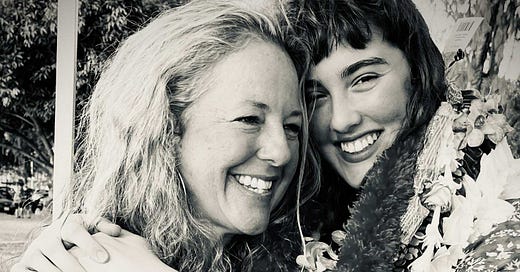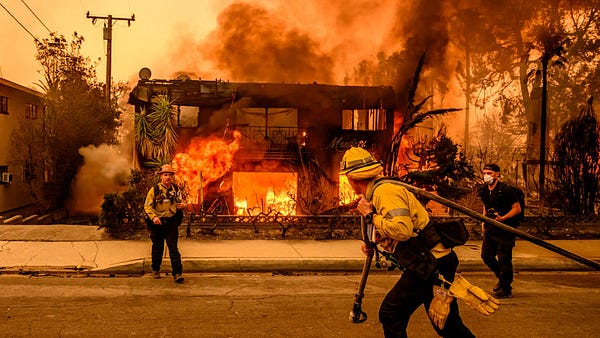
At the end of August, we ran a special series on What School Didn’t Teach Us, in which Joe Nocera described his path into journalism and Julia the Intern explained why she wanted to try farming before taking up her place at Stanford. (You can catch up with it.)
In response to the series, we got a letter from K.L. Evans, who homeschooled her daughter Ruby LaRocca—otherwise known as the winner of our first-ever High School Essay Contest. Last year, Ruby wrote us a gorgeous Constitution for Teenage Happiness. Reading her mother’s letter—about what you can learn in school, if you have the right teacher—we now get how Ruby ended up so wise beyond her years.
The best students are the bad ones. That was my great discovery in school. I was not belligerent or idle, just a little deviant. Dreamy. I would dodge what I was supposed to be doing and work industriously on projects that were not asked for and would never have been assigned. (Bold, unwieldy affairs that required enormous effort and patience and drew tiny audiences.) I tortured and enjoyed myself. Pondered long and earnestly on how I should make use of my life. I met with many successes but of a kind so marginal they scanned as failures. People found me charming and ridiculous.
My favorite teachers were the same: unpredictable, untidy, gifted in a way that only a handful of people appreciated. They tended to be honest, and so uncertain about their own effectiveness. Both exacting and affable. Bound absurdly to the twin demands of scholarship and art. Never friendless, but often lonely. (I know because eventually I became one of them.) I found my teachers in old books, in novels and plays and films, and occasionally in real life. Some who I knew in person were just assigned to me, and I had the good sense to cling to them like a barnacle. Some wrote books that taught me how to think, and once in a while I would be brave enough to send a letter to one of these hardworking scholars, and the most generous of them would write back. Corresponding with lively intellectuals far beyond my limited circle of acquaintance was almost as exciting as coming to understand with profit those playful, dynamic, radical works of education sometimes called “classics.”
A classic is one of those rare, synoptic books around which a whole life can evolve, or which becomes deeper as one becomes deeper. That’s why classics have what Ezra Pound calls “a certain eternal and irrepressible freshness.” They do not reinforce but challenge our habitual, settled ways of thinking—which is perhaps why so many people assiduously avoid reading them. As the playwright Alan Bennett jokes, “A classic is a book everyone is assumed to have read and often thinks they have read themselves.” Of course, school is not the only place one could find readers of such books, but in my experience, school was where you found them. (Even if on the perimeter, without a formal position.)
My point is that the experience of formal education missing from the Editors’ recent investigation into “What School Didn’t Teach You” is the one clung to by the most serious teachers and students: Those eccentrics and oddballs who associate school with the charged, productive space one person opens up for another. The philosopher Stanley Cavell said a teacher is any person who “shows one a way to do relevantly and fruitfully the thing one had almost given up hope of doing.” According to this view, “school” is where students find (only by looking) teachers (not all, not most, but a small, animated faction) game to ward off the stultifying atmosphere in which educators take up a mode of explanation premised on students’ inability—in which teaching assumes the form, “I must explain this to you, since you cannot understand it yourself.” Most people feel fondly about school in proportion to how much they practiced thinking, unraveling difficulties, for themselves.
Schooling as I experienced it and tried to re-create for my students felt less conventional, more bohemian than the kind of pre-professional training the contributors to your series rightly fled—for the farm, the newsroom, or the workshop. A very clever friend of mine (one of those brilliant, legendary, unemployed intellectuals happily occupying what John Ashbery calls the “category of oblivion which increasingly threatens any artist who dares to take his own way”) says that human genius is like grass breaking through concrete; it persists even in situations of institutional hostility. School is and ought to be the straining, daring green and the crushing pavement—minus which the grass ain’t so beautiful.
Do you have a unique perspective on a Free Press story? Can you bring your personal experience or expertise to bear on an issue we cover? We want to hear from you. Send us a letter to the editor: Letters@TheFP.com.
To support our work, become a Free Press subscriber today:
















“I must explain this to you, since you cannot understand it yourself.” - great perspective on the attitude of many educational institutions to their students. Part of what I liked so much about doing graduate school online was 80% of my learning was reading books on my own time. While figuring out myself how to apply the content to the real world. A skill I use at work everyday. Most of what the professors did was critique, which is probably how it should be. I liked it a lot more than how things were during my undergrad.
My older brother taught himself to write computer code when he was 12. By the end of high school he was running his own web hosting company with two employees in India doing tech support for customers. 18 years old, self-taught and already outsourcing jobs. God bless America.
I wish school had more of an emphasis on self directed learning.
A long time ago, I remember trying to convince my fellow high school classmates, as we were reading Huxley's Brave New World, that it would be better to take the Soma and follow Ford than the alternative.
Of course, no one identifies with a society that drugs its citizens and creates a strict caste system. I didn't find any takers for my argument.
And yet... we now have a public school system that, through DEI, advocates exactly that. Perhaps the argument would proceed differently today, though I doubt any teacher interested in remaining employed would teach Brave New World.
We have to fight it because, like John in the novel, we were born in exile and cannot find happiness in that society.
Now, as we raise children, we see them joining their peers on TikTok, in classrooms where they are taught to express their feelings (as long as they are appropriate feelings) and disdain anything uncomfortable, like learning about the world.
What to do?